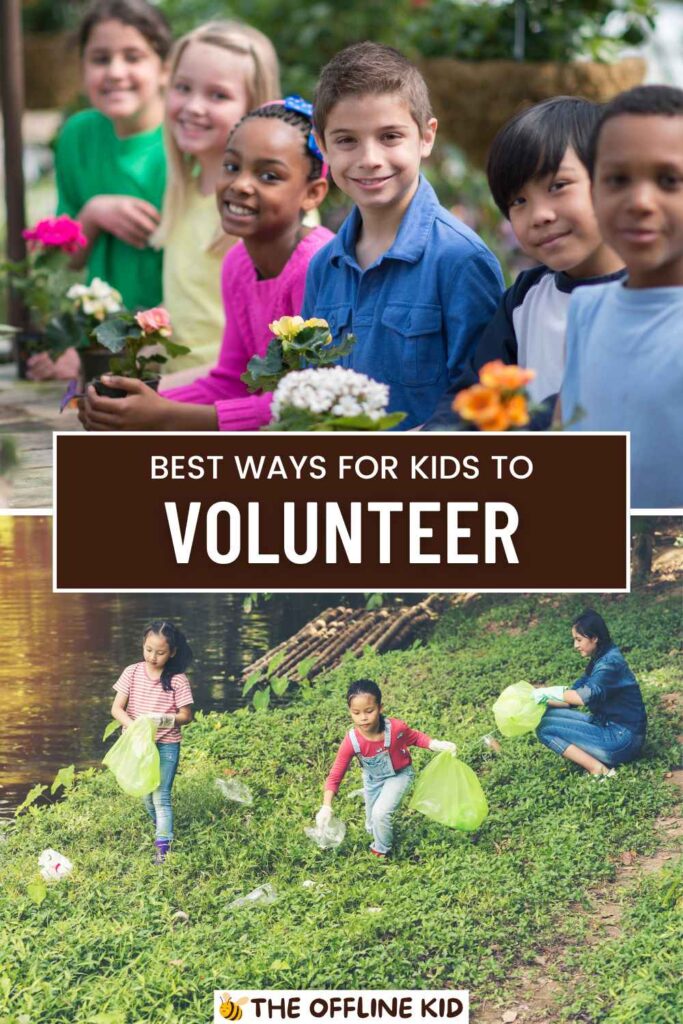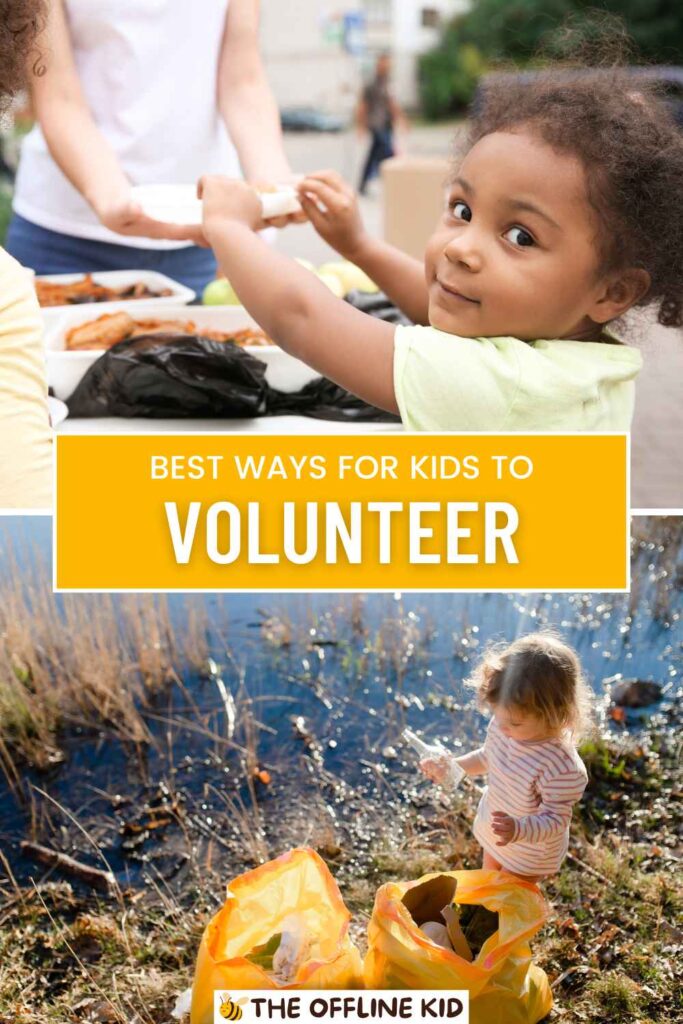Volunteering is a fantastic way for kids to make a positive impact, learn valuable skills, and develop a sense of community.
This guide will explore fun and meaningful ways for children to get involved in volunteering and start their journey of giving back.
Understanding Volunteering
What is Volunteering?
Volunteering involves offering time and skills to benefit others without expecting financial reward.
It’s a powerful way to contribute to society, help those in need, and promote a sense of community and civic responsibility.
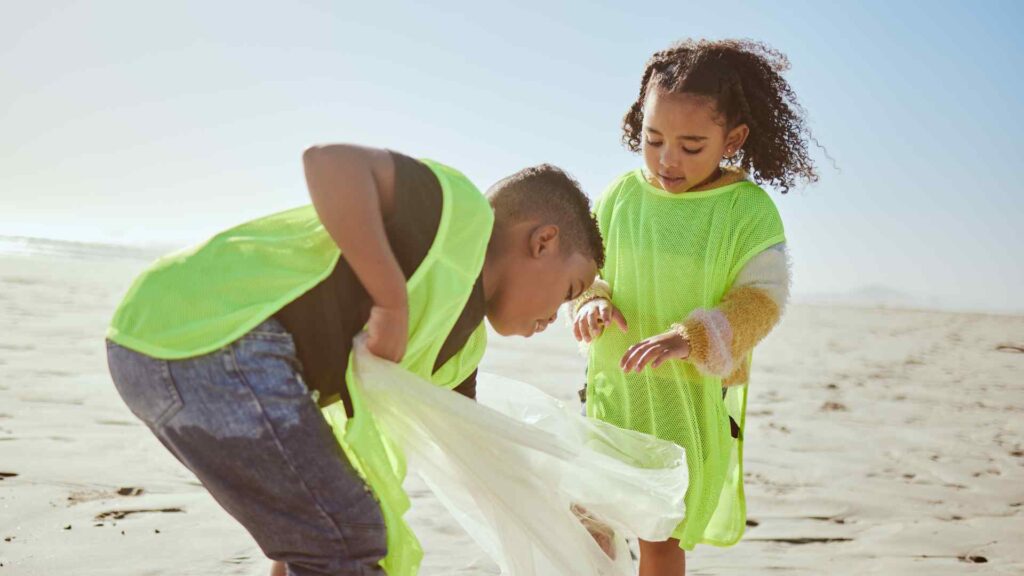
Different Types of Volunteering
Volunteering comes in various forms, each offering unique opportunities for kids to get involved.
Local Volunteering
Engaging in activities within your own community. Examples include:
- Community cleanups: Picking up litter in parks or streets.
- Local food drives: Collecting non-perishable food for local food banks.
- Neighborhood beautification: Planting flowers or painting murals.
National Volunteering
Opportunities that have a broader impact across the country. Examples include:
- National service days: Participating in events like Martin Luther King Jr. Day of Service.
- Charity fundraisers: Joining large-scale fundraising events for national organizations.
International Volunteering
For older kids, opportunities to contribute globally. Examples include:
- Pen pal programs: Writing letters to children in other countries.
- Cultural exchange projects: Participating in programs that foster international understanding and aid.
Age-Appropriate Volunteering Opportunities
It’s essential to match volunteering activities with the child’s age and abilities to ensure a positive and productive experience.
For Younger Kids (Ages 5-10)
- Simple tasks: Sorting donations, decorating cards for seniors, or helping in a community garden.
- Family involvement: Participating in family-friendly events and activities.
For Tweens (Ages 11-13)
- More responsibility: Assisting in organizing events, tutoring younger kids, or helping with pet adoption events.
- Leadership opportunities: Taking on roles that require some level of planning and leadership within supervised environments.
For Teens (Ages 14-18)
- Independent projects: Initiating and leading community service projects, volunteering at local non-profits, or participating in international service trips.
- Specialized skills: Using specific skills like web design for non-profits, coaching younger sports teams, or volunteering as a camp counselor.
How to Find Volunteer Opportunities for Kids
Finding the right volunteering opportunities can be easy with the right resources.
Local Community Centers
- Check bulletin boards: Community centers often post local volunteer opportunities.
- Attend community meetings: Get involved and learn about upcoming projects and needs.
Schools and Educational Programs
- School clubs and initiatives: Many schools have clubs focused on community service.
- Service-learning programs: Integrated programs that combine learning objectives with community service.
Online Platforms and Apps
- VolunteerMatch: A website that matches volunteers with organizations based on interests and location.
- DoSomething.org: A platform that offers various campaigns and projects for young people.
Preparing Kids for Volunteering
It’s crucial to prepare kids for their volunteer experience to ensure they understand their roles and responsibilities.
- Set clear expectations: Discuss what they will be doing, the time commitment, and the importance of their work.
- Role-play scenarios: Help them understand what to expect and how to handle different situations.
- Emphasize the impact: Explain how their efforts will help others and contribute to the community.
Safety and Supervision
Ensuring a safe and positive experience is paramount.
- Adult supervision: Younger children should always be supervised by an adult during volunteer activities.
- Safety protocols: Teach kids about any safety procedures relevant to their volunteer work.
- Emergency contacts: Make sure they know who to contact in case of an emergency.
By understanding the basics of volunteering and finding age-appropriate opportunities, kids can start their journey of making a difference in their communities and beyond.
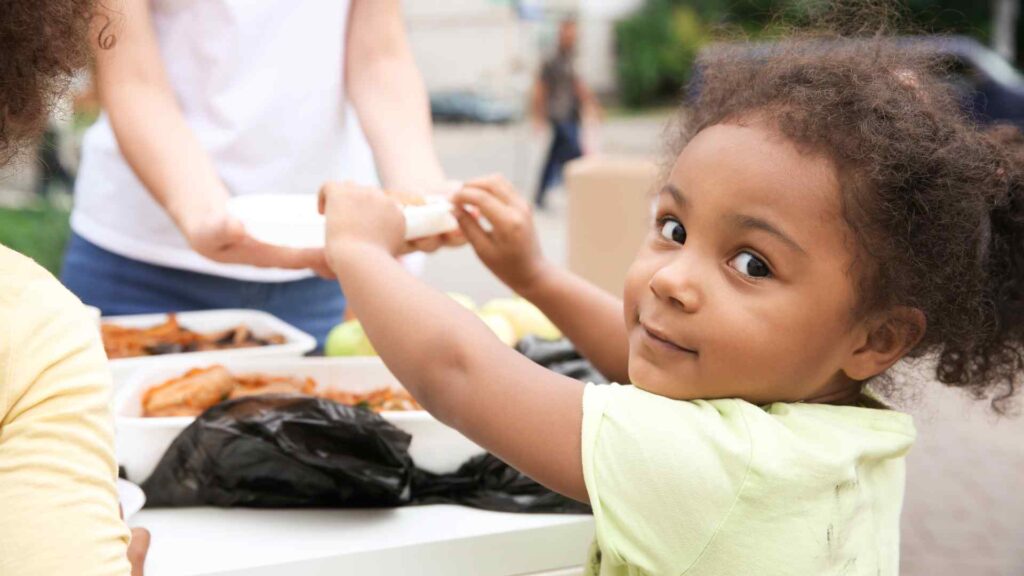
Getting Started
How to Find Volunteer Opportunities for Kids
Finding the right volunteer opportunities can be simple with a few helpful resources. Here are some ways to locate and select the best volunteering options for children.
Local Community Centers
- Check Bulletin Boards: Many community centers have bulletin boards with postings about local volunteer opportunities.
- Attend Community Meetings: Join local meetings to learn about upcoming projects and events that need volunteers.
- Community Newsletters: Subscribe to local newsletters for updates on volunteer needs and events.
Schools and Educational Programs
- School Clubs and Initiatives: Many schools offer clubs and programs focused on community service.
- Service-Learning Programs: These programs combine learning objectives with community service, offering students a chance to apply what they learn in the classroom to real-world situations.
- School Events: Participate in school-sponsored events like charity drives, fairs, and clean-up days.
Preparing Kids for Volunteering
Preparation is key to ensuring a positive and impactful volunteer experience for kids. Here’s how to get started:
Setting Clear Expectations
- Discuss Roles and Responsibilities: Clearly explain what the child will be doing during their volunteer activity.
- Time Commitment: Ensure they understand how much time they will be expected to dedicate.
- Importance of Their Work: Emphasize how their efforts will help others and contribute to the community.
Role-Playing Scenarios
- Practice Situations: Role-play different scenarios they might encounter to help them feel more confident and prepared.
- Problem-Solving: Teach them how to handle potential challenges or conflicts that may arise during their volunteer work.
Emphasizing the Impact
- Real-Life Stories: Share stories of other young volunteers and the positive impact they’ve made.
- Community Benefits: Explain how their contributions will directly benefit the community or cause they are helping.
Safety and Supervision
Ensuring safety and proper supervision is crucial for a successful volunteer experience.
Adult Supervision
- Always Supervise Young Children: Ensure younger kids are always supervised by an adult during volunteer activities.
- Safe Environments: Choose volunteering opportunities that take place in safe and secure environments.
Safety Protocols
- Teach Safety Procedures: Make sure kids understand any safety protocols related to their volunteer work, such as wearing protective gear or following specific guidelines.
- Emergency Contacts: Ensure they know who to contact in case of an emergency and have a list of important phone numbers.
Age-Appropriate Tasks
- Match Tasks to Age: Select tasks that are suitable for the child’s age and abilities to ensure they can participate safely and effectively.
- Gradual Responsibility: Start with simpler tasks and gradually introduce more responsibilities as the child gains experience and confidence.
By following these steps to find and prepare for volunteer opportunities, kids can embark on a rewarding journey of giving back to their communities while ensuring a safe and enjoyable experience.
Volunteering Ideas for Kids
Environmental Volunteering
Helping the environment is a rewarding way for kids to volunteer, teaching them about the importance of sustainability and conservation.
Park Cleanups
- Organize a Local Park Cleanup: Gather friends, family, and neighbors to pick up litter in local parks.
- Join Existing Cleanups: Many organizations host regular park cleanups that kids can join.
Tree Planting Events
- Participate in Tree Planting Days: Many communities hold tree planting events where kids can help plant and care for new trees.
- Start a Tree Planting Project: Kids can work with local environmental groups to start a tree planting initiative in their neighborhood.
Recycling Drives
- Host a Recycling Drive: Collect recyclables like paper, plastic, and aluminum from neighbors and take them to a recycling center.
- Educate on Recycling: Create posters or flyers to educate the community about the importance of recycling and how to do it correctly.
Beach and River Cleanups
- Join Waterway Cleanups: Many environmental organizations host cleanups for beaches, rivers, and lakes where kids can help remove trash.
- Organize a Local Cleanup: Plan a cleanup event at a nearby beach or river and invite the community to participate.
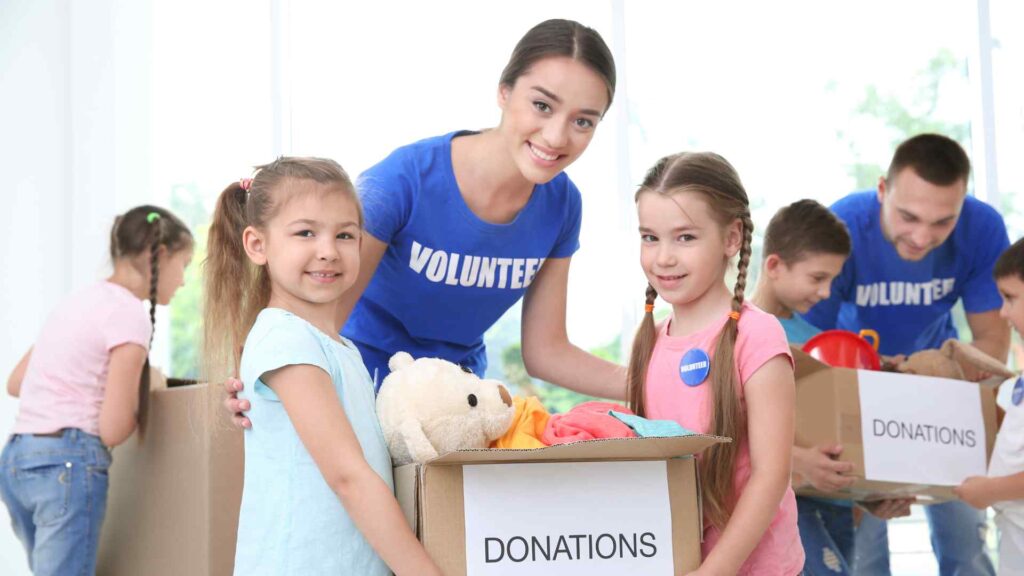
Animal-Related Volunteering
Volunteering with animals can be both fun and educational, teaching kids about animal care and compassion.
Volunteering at Animal Shelters
- Help with Daily Tasks: Kids can assist with feeding, cleaning, and playing with animals at local shelters.
- Fundraising for Shelters: Organize events to raise funds for animal shelters and their needs.
Dog Walking Programs
- Walk Shelter Dogs: Many shelters have programs where volunteers can take dogs for walks, providing them with exercise and socialization.
- Neighborhood Dog Walking: Offer dog walking services to neighbors, especially for elderly or disabled pet owners.
Wildlife Conservation Projects
- Participate in Conservation Efforts: Join local wildlife conservation projects, such as building birdhouses or maintaining wildlife habitats.
- Educate on Wildlife Protection: Create educational materials to inform the community about protecting local wildlife.
Fundraising for Animal Welfare Organizations
- Organize Fundraisers: Plan events like bake sales, car washes, or donation drives to raise money for animal welfare organizations.
- Create Awareness Campaigns: Use social media to spread awareness and support for animal welfare causes.
Community and Social Volunteering
Helping people in the community fosters a sense of empathy and social responsibility in kids.
Visiting Nursing Homes and Assisted Living Facilities
- Spend Time with Residents: Visit and spend time with elderly residents, playing games, reading, or just chatting.
- Host Activities: Organize activities like arts and crafts, music performances, or holiday celebrations for residents.
Helping at Food Banks and Soup Kitchens
- Sort and Pack Food: Assist with sorting, packing, and distributing food at local food banks.
- Serve Meals: Help serve meals at soup kitchens and community meal programs.
Participating in Community Gardens
- Plant and Maintain Gardens: Work in community gardens, planting vegetables, fruits, and flowers.
- Harvest and Distribute Produce: Help harvest and distribute the garden’s produce to local food banks or community members in need.
Organizing Clothing and Toy Drives
- Collect Donations: Gather gently used clothing and toys from friends, family, and neighbors.
- Distribute to Those in Need: Work with local organizations to distribute the donations to families in need.
Educational Volunteering
Volunteering in educational settings helps kids develop teaching skills and share their knowledge with others.
Tutoring Younger Children
- Help with Homework: Assist younger kids with their homework and study for tests.
- Teach New Skills: Offer to teach skills like reading, writing, or math to kids who need extra help.
Reading Programs at Libraries
- Storytime Sessions: Volunteer to read stories to young children during library storytime sessions.
- Organize Book Drives: Collect and donate books to local libraries or schools.
Assisting in After-School Programs
- Support Activities: Help with activities and programs offered after school, such as sports, arts and crafts, or homework help.
- Mentor Younger Students: Act as a mentor, providing guidance and support to younger students.
Summer Camp Volunteering
- Counselor-in-Training: Older kids can volunteer as counselors-in-training at summer camps, helping with activities and supervising younger campers.
- Assist with Camp Programs: Help organize and run various camp programs and events.
Health and Wellness Volunteering
Kids can contribute to health and wellness initiatives, promoting healthy living and supporting those in need.
Fundraising for Health Charities
- Organize Fundraisers: Plan events like fun runs, bake sales, or car washes to raise money for health-related charities.
- Create Awareness Campaigns: Use social media to spread awareness about health issues and encourage support for related charities.
Participating in Walkathons and Runathons
- Join Charity Walks/Runs: Participate in walkathons and runathons to raise money for health causes.
- Sponsor Others: Raise funds by getting sponsors for participating in these events.
Helping with Blood Drives
- Promote Blood Drives: Create posters and flyers to encourage community members to donate blood.
- Assist at Blood Drive Events: Help with registration, handing out refreshments, and providing support to donors.
Creating Care Packages for Hospital Patients
- Assemble Care Packages: Collect items like books, puzzles, and snacks to create care packages for hospital patients.
- Distribute Packages: Work with hospitals to distribute the care packages to patients, bringing a bit of joy and comfort to their stay.
By exploring these diverse volunteering ideas, kids can find opportunities that match their interests and skills, allowing them to make a meaningful impact in their communities and beyond.
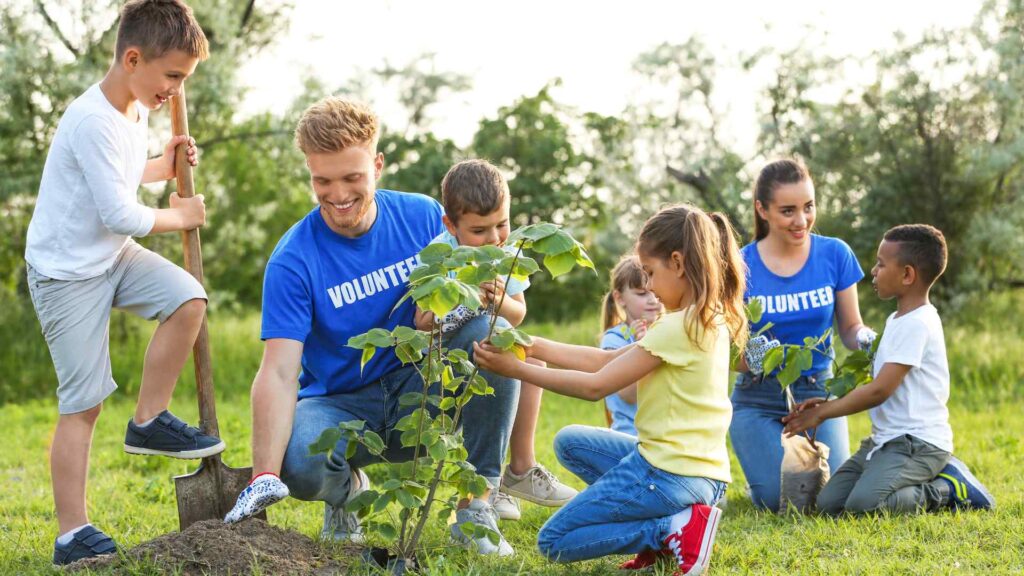
Making Volunteering Fun
Turning Volunteering into a Family Activity
Volunteering as a family not only strengthens family bonds but also sets a powerful example for children about the importance of giving back.
Family Volunteer Projects
- Community Cleanups: Plan regular family outings to clean up local parks or beaches.
- Food Drives: Organize a neighborhood food drive with the whole family participating in collecting and delivering donations.
- Holiday Volunteering: Spend holidays volunteering together at shelters, food banks, or community events.
Family Traditions
- Annual Volunteering Day: Establish an annual family volunteering day dedicated to a specific cause.
- Monthly Volunteering Activities: Schedule monthly activities where the whole family participates in a volunteer project.
Volunteering with Friends: Building Teamwork and Social Skills
Volunteering with friends can make the experience more enjoyable and help develop teamwork and social skills.
Group Volunteer Projects
- Group Cleanups: Organize cleanup events with friends in local parks or community spaces.
- Fundraising Events: Plan and host fundraising events like car washes, bake sales, or yard sales together.
- Volunteering Clubs: Start a volunteer club at school where friends can come together to plan and participate in community service projects.
Social Benefits
- Strengthen Friendships: Working together on volunteer projects can strengthen existing friendships and foster new ones.
- Develop Leadership Skills: Taking on roles and responsibilities in group projects helps kids develop leadership and organizational skills.
Incorporating Interests and Hobbies into Volunteering
Finding volunteer opportunities that align with a child’s interests and hobbies can make the experience more engaging and enjoyable.
Creative Volunteering
- Art Projects: Use artistic skills to create murals, posters, or decorations for community centers, hospitals, or shelters.
- Music and Performance: Perform music or organize talent shows to entertain residents at nursing homes or community events.
Sports and Outdoor Activities
- Sports Clinics: Volunteer to assist with sports clinics or coach younger kids in local sports leagues.
- Outdoor Adventures: Organize nature hikes, park cleanups, or gardening projects that combine a love for the outdoors with volunteer work.
Academic and Educational Interests
- Tutoring and Mentoring: Use academic strengths to tutor or mentor younger students in subjects like math, science, or reading.
- Library Programs: Volunteer at local libraries to help with reading programs, book drives, or organizing events.
Recognizing and Celebrating Volunteer Efforts
Recognizing and celebrating volunteer efforts can keep kids motivated and help them see the value of their contributions.
Certificates and Awards
- Volunteer Certificates: Create and present certificates of appreciation for completed volunteer projects.
- Community Awards: Nominate kids for local or national volunteer awards to acknowledge their efforts.
Sharing Stories
- Storytelling Sessions: Encourage kids to share their volunteering experiences with family and friends.
- Social Media: Use social media to highlight and celebrate volunteer achievements, inspiring others to get involved.
Reflection and Feedback
- Journaling: Encourage kids to keep a journal of their volunteering experiences, noting what they learned and how they felt.
- Feedback Sessions: Have regular family or group discussions to reflect on volunteer projects, sharing successes and areas for improvement.
By incorporating fun elements, family involvement, and personal interests into volunteering, kids can have enjoyable and meaningful experiences that foster a lifelong love of giving back to their communities.
Stories from Young Volunteers
Inspirational Stories from Kids Who Made a Difference
Hearing about other young volunteers can be incredibly motivating. These stories show how kids can make a significant impact on their communities and the world.
Aiden’s Park Cleanup Initiative
- The Problem: Aiden noticed his local park was often littered with trash.
- The Action: He organized a weekly park cleanup with friends and family.
- The Impact: The park became a cleaner, safer place for everyone to enjoy, and Aiden’s efforts inspired others in the community to join in.
Sofia’s Animal Shelter Fundraiser
- The Problem: Sofia learned that her local animal shelter was struggling with funding.
- The Action: She organized a series of bake sales and car washes to raise money for the shelter.
- The Impact: Sofia’s fundraising efforts provided much-needed supplies and improved conditions for the animals. Her initiative also raised awareness about the shelter’s needs.
Marcus’ Tutoring Program
- The Problem: Marcus saw that some of his younger classmates were struggling with math.
- The Action: He started an after-school tutoring program to help them.
- The Impact: The students’ grades improved, and Marcus developed strong leadership and teaching skills. His program became a valuable resource for the school.
Interviews with Young Volunteers
Hearing directly from young volunteers can provide insights and inspiration.
Emma, Age 12
- Volunteer Activity: Emma volunteers at a community garden.
- Why She Volunteers: “I love gardening, and it’s great to see how our hard work helps feed families in need.”
- Her Advice: “Find something you love to do and use it to help others. It’s fun and makes a big difference.”
Jake, Age 14
- Volunteer Activity: Jake helps at a local food bank.
- Why He Volunteers: “I wanted to help people who are less fortunate. It feels good to know I’m making a difference.”
- His Advice: “Don’t be afraid to start small. Every little bit helps, and you can always do more as you get more comfortable.”
Lily, Age 10
- Volunteer Activity: Lily reads to children at her local library.
- Why She Volunteers: “I love books, and it’s fun to share stories with other kids.”
- Her Advice: “Volunteering doesn’t have to be hard. Just find something you enjoy and share it with others.”
How Volunteering Has Changed Their Lives
Volunteering can have a profound impact on the lives of young people, shaping their values and future choices.
Building Confidence and Leadership Skills
- Example: Volunteering often involves taking on responsibilities and leading projects, which can build confidence and leadership abilities. Kids learn to organize events, manage tasks, and lead groups, which are valuable skills for the future.
Developing Empathy and Compassion
- Example: Working with people from different backgrounds and in various situations helps kids develop empathy and compassion. They learn to understand and appreciate the challenges others face and feel more connected to their communities.
Fostering a Sense of Purpose and Achievement
- Example: Accomplishing volunteer projects and seeing the positive impact of their efforts gives kids a sense of purpose and achievement. This can boost their self-esteem and motivate them to continue contributing to their communities.
Inspiring Future Careers and Interests
- Example: Volunteering can spark interests that influence future career choices. For instance, a child who volunteers at an animal shelter might be inspired to pursue a career in veterinary medicine or animal welfare.
By sharing these inspirational stories and interviews, kids can see the tangible benefits and rewards of volunteering, encouraging them to get involved and make a difference in their own communities.
